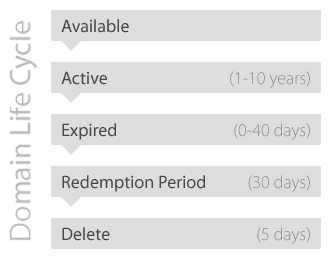In this article I would like to examine the typical lifecycle of a gTLD domain name. I will describe all the steps of the lifecycle from registration to deletion as well as discuss various transfer restrictions.
First of all, let's define what a gTLD is. The term "gTLD" stands for generic toplevel domain. Among the list of gTLD's you can find the following: .aero, .asia, .biz, .cat, .com, .coop, .edu, .gov, .info, .int, .jobs, .mil, .mobi, .museum, .name, .net, .org, .pro, .tel, .travel. A full and always updated list of all TLD's can be found at wikipedia.
I emphazised the most common gTLD's for better reading and because I will focus mainly on .com, .net, .org, .info, .biz. For the regular John Doe and even for domain brokers these are the most relevant.

1. Available
You can register a domain name that is available. You can use so called whois tools to check if your desired domain name is available for registration. The easiest way to check the availability is to type whois domain.com in your terminal. Most registrars have whois tools that you can use as well.
Immediately upon registration of a domain name, it enters the so calledregistrar lock status for 60 days (with every change to a gTLD's whois record) and is not available for registration anymore. However, it can take to 48 hours before a whois record is created/ updated for a domain name.
2. Active
After you have registered a domain name, it becomes active. You can register a domain name for up to 10 years in advance. The minimum registration period of a TLD can vary. For example, with .com it is 1 year, .biz has a minimum of two years.
3. Expired
If you do not renew your registration or forget to pay for your name, it will technically expire. The expiration period is usually up to 40 days long. During the expiration period a domain name usually gets the registrar-hold status. This means the the name cannot be transferred to another registrar. Please understand this as a security to prevent accidental loss of a domain name. The registrant will be informed about the situation via the admin-c email and has the poortunity to renew the domain without any additional costs or fees.
4. Redemption Period
Once the domain name leaves the registrar-hold status it enters the so calledredemption period which still allows the (former) owner to renew the domain name for up to 30 days. More common is a 10 days-long redemption period. Rarely registrars offer a redemption period of up to 35 days, because ICANNworks with a 5 day pending delete status. During the redemption period domain and mail do not work anymore (domain not in zone anymore).
5. Delete/ Available
After the redemption period and pending delete status, the domain name will drop and it becomes available for registration again. This is the moment where domain brokers and other people with interest in the domain name, try to catch it within seconds after it becomes available again. Some registrars make money out of this and offer so called aftermarkets where they list the domains in expiration, redemption and pending delete status. If the previous owner does not renew the domain in time, the registrar sells it at the highest aftermarket price and renews it for the new owner right before the domain name drops.
Please be aware:
Although all registrars are required (by ICANN) to follow a standard domain life cycle, many do not. Making money out of valuable domain names is obviously not only interesting for domain brokers but registrars as well.
To prevent highjacking, put your domain in the registrar lock status. Many registrars offer this option in their interfaces. This secures your domain from beeing transferred to another registrar and helps to make sure nobody changes the whois record for your domain name. Many companies and individuals even insure their most valuable domain names with a domain insurance and/ or inform themselves at institutions like CADNA or ICA about what they can do to practice secure domaining.






 FEEDBACK
FEEDBACK COMMENTS
COMMENTS PRINT
PRINT SUBMIT ARTICLE
SUBMIT ARTICLE RSS
RSS
